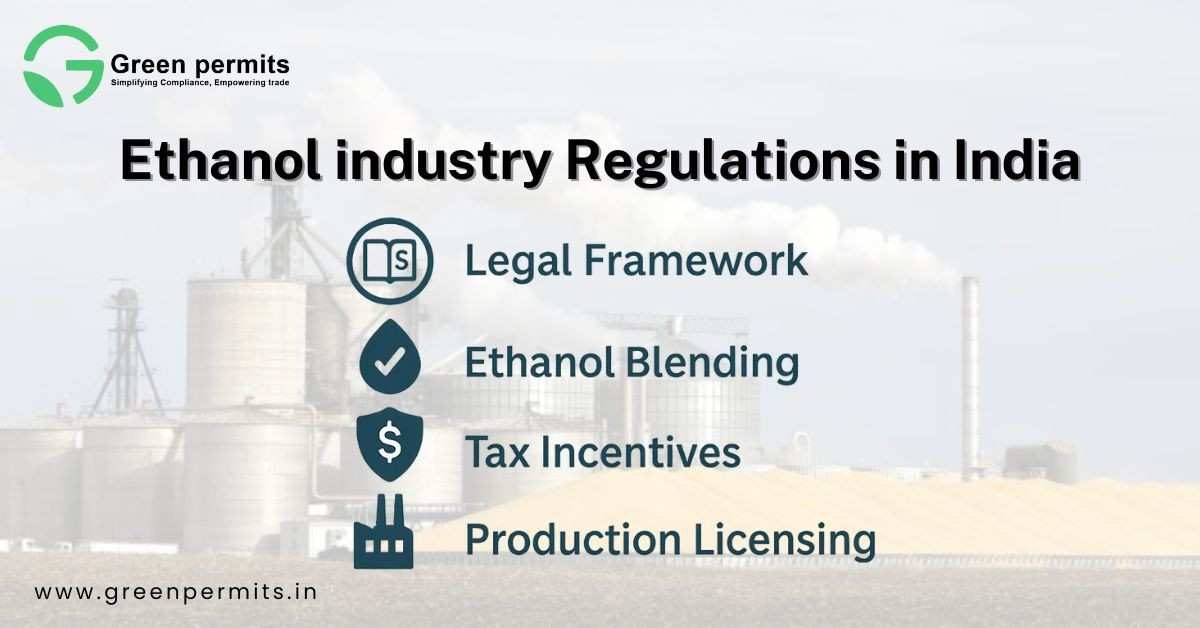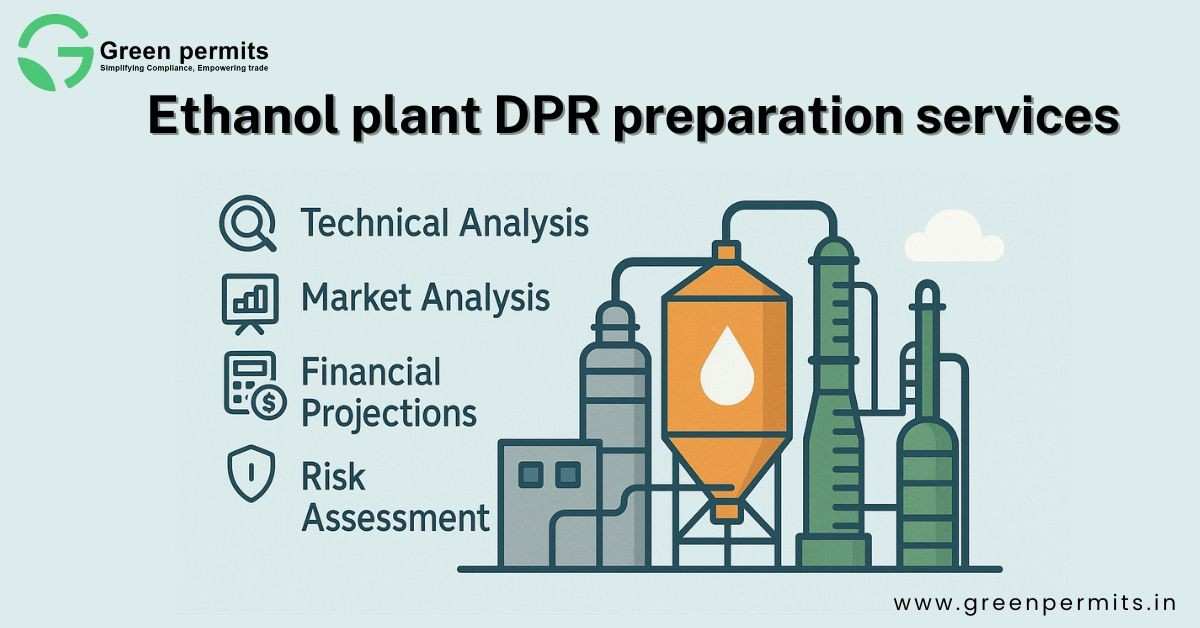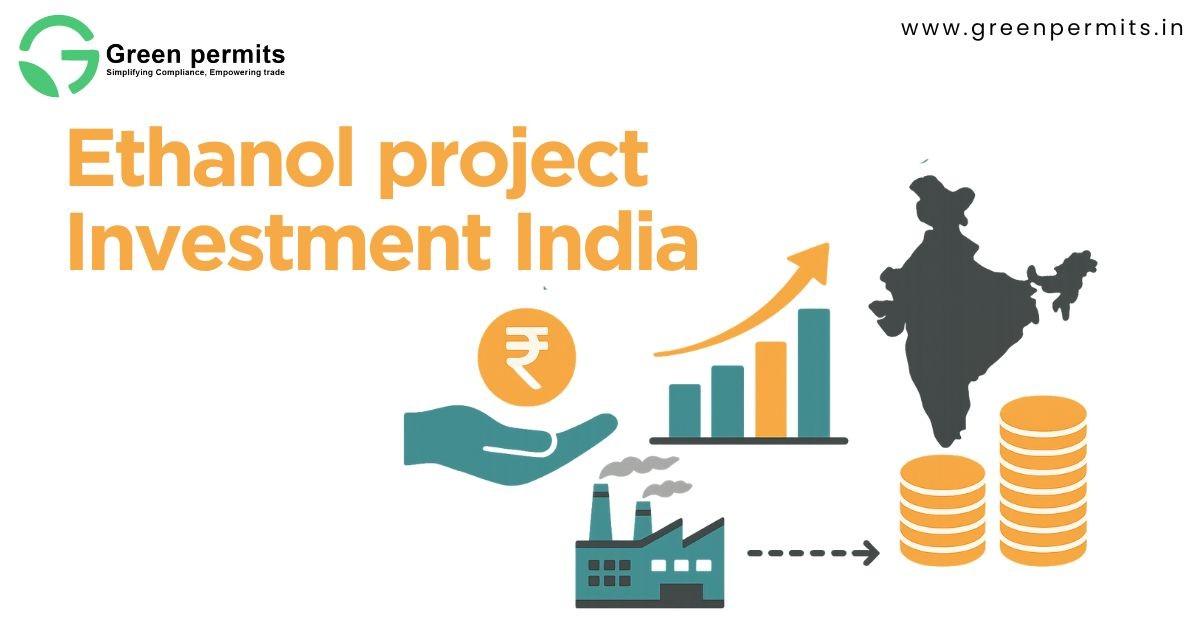India is betting big on ethanol. With the government advancing the 20% ethanol blending target (E20) to Ethanol Supply Year (ESY) 2025-26, distilleries, sugar mills, and grain processors see both opportunity and complexity. Production has already touched 17.98% blending by February 2025, a remarkable jump from just 12% in 2022. But growth is tied directly to how well businesses navigate the country’s evolving regulatory ecosystem.
This guide explains the policy framework, regulatory approvals, environmental norms, incentives, and compliance requirements every ethanol player in India must know.
Understanding India’s Ethanol Policy Landscape
The ethanol program in India is anchored in the Ethanol Blending Program (EBP) under the Ministry of Petroleum & Natural Gas (MoPNG). It sets blending targets, ensures procurement by Oil Marketing Companies (OMCs), and defines administered pricing for ethanol produced from molasses, grains, and even 2G (cellulosic) sources.
But ethanol plants are regulated by multiple agencies:
- MoEFCC (Ministry of Environment, Forest & Climate Change): Grants Environmental Clearance (EC) for distilleries.
- CPCB & SPCBs (Pollution Control Boards): Issue Consent to Establish (CTE) and Consent to Operate (CTO) under the Air and Water Acts. CPCB also notifies Zero Liquid Discharge (ZLD) SOPs for distilleries.
- BIS (Bureau of Indian Standards): Sets ethanol quality benchmarks for blending fuel (IS 17821:2022 for ethanol, IS 17021:2018 for E20 blends).
- Excise Departments (State & Centre): License ethanol production, storage, and transport.
- DGFT & Customs: Regulate import/export of ethanol and related raw materials.
This multi-layered framework means businesses must prepare for a structured compliance journey before commissioning ethanol production.
Key Government Rules Governing Ethanol Plants
While the EBP roadmap sets blending percentages, plant owners must comply with specific laws and notifications:
- Environment (Protection) Act, 1986 – umbrella law for pollution and emissions.
- Air Act, 1981 & Water Act, 1974 – SPCB approvals for emissions and effluent discharge.
- Hazardous & Other Waste (M&TM) Rules, 2016 – authorization for distillery sludge and hazardous residues.
- E-Waste, Battery, and Plastic Waste Rules (2022–25 amendments) – though focused on other industries, they are introducing QR/barcode traceability and digital return filing, trends likely to extend to ethanol packaging and reporting.
- BIS Standards – mandatory compliance with IS 17821:2022 for ethanol supplied to OMCs.
- State Excise Laws – control licensing, duty exemptions, and inter-state movement of ethanol.
Step-by-Step Checklist for Ethanol Plant Approvals
Setting up an ethanol plant requires approvals in a specific sequence. Missing steps or filing late can delay commissioning by months.
Checklist:
- Site & Land Clearances
- Land classification for industrial use
- Local zoning approvals
- Environmental Clearance (MoEFCC)
- EIA report submission
- Category A or B classification
- Public hearing (if required)
- Pollution Control Consents (SPCB)
- Consent to Establish (CTE)
- Consent to Operate (CTO)
- ZLD compliance plan
- Hazardous Waste Authorization
- For distillery sludge, boiler ash, spent wash
- Factory, Fire & Safety Clearances
- Chief Inspector of Factories approval
- Fire NOC
- BIS Certification
- IS 17821:2022 certification for ethanol fuel
- Testing & audit of quality
- Excise Licensing
- State excise PD2 permit (for production, denaturation, and sale)
- Bonded storage approvals
- OMC Tie-Ups
- Registration with IOC, BPCL, HPCL tenders
- Long-term procurement agreements
Comparing Plant Types: Molasses vs Grain vs 2G Ethanol
Choosing the right feedstock affects not just CapEx but also regulatory scrutiny and government incentives.
| Parameter | Molasses-Based | Grain-Based | 2G (Cellulosic) |
|---|---|---|---|
| CAPEX (₹/KLPD) | 90–100 Cr | 120–150 Cr | 300–400 Cr |
| Raw Material | Sugarcane molasses | Maize, rice, grains | Agri-residues (paddy straw, bagasse) |
| Govt Incentives | High (sugar surplus diversion) | Medium (grain allocation policy) | Very High (special subsidies + viability gap funding) |
| Approval Complexity | Moderate | Higher (food grain allocation & Excise scrutiny) | Very High (R&D + EC challenges) |
| Timeline | 18–24 months | 24–30 months | 36–48 months |
Subsidies, Incentives & OMC Procurement
To push ethanol adoption, the government has built a strong incentive system:
- Soft Loans: Central schemes offering low-interest loans for new distilleries.
- Viability Gap Funding (VGF): Especially for 2G ethanol plants using crop residues.
- Excise Concessions: Duty waivers in some states to reduce production costs.
- State Subsidies: Uttar Pradesh, Maharashtra, and Bihar offer capital subsidies and tax incentives.
- OMC Contracts: Long-term procurement by IOC, BPCL, and HPCL ensures steady demand and reduces risk.
ESG & Sustainability Compliance
Ethanol plants must increasingly align with environmental and sustainability norms:
- Zero Liquid Discharge (ZLD) – CPCB mandates that molasses-based distilleries adopt ZLD to minimize water pollution.
- GHG Reduction – Every litre of ethanol blended reduces ~2.7 kg of CO₂ emissions compared to petrol.
- Water & Energy Efficiency – ESG audits now assess water recycling, renewable energy use, and effluent management.
- CSR & ESG Reporting – Larger corporates must disclose ethanol compliance as part of sustainability reporting.
Case Study: A Grain Ethanol Plant in Uttar Pradesh
A 60 KLPD grain-based ethanol plant in UP showcases the opportunity and challenges:
- Investment: ₹150 Crore
- Approval Timeline: ~18 months for EC, SPCB consents, BIS, and Excise permits
- Procurement: Secured a 5-year supply contract with OMCs at administered prices
- Outcome: Payback in ~4 years due to steady procurement + state subsidies
- Learning: Early filing of SPCB consents and engaging with BIS labs reduced bottlenecks
Common Challenges & Penalties for Non-Compliance
- SPCB Delays: Consent renewals often take 3–6 months.
- Effluent Norm Violations: Heavy fines or plant closure for not meeting ZLD norms.
- BIS Non-Compliance: Can result in rejection of ethanol by OMCs.
- Excise Penalties: Unauthorized production or storage can trigger seizure.
- Reporting Lapses: With CPCB moving to digital filing, failure to file returns may attract environmental compensation.
FAQs on Ethanol Industry Regulations
India has advanced its target to 20% blending (E20) by ESY 2025-26, with ~18% achieved by early 2025.
You’ll need MoEFCC Environmental Clearance, SPCB CTE/CTO, Hazardous Waste Authorization, BIS certification, Excise license, and OMC registration.
Typically 3–6 months depending on the state, provided applications and compliance documents are complete.
Yes. Central government offers soft loans and VGF; states like UP and Maharashtra offer capital subsidies; OMCs guarantee procurement.
Fuel-grade ethanol must meet IS 17821:2022 specifications, and E20 petrol must meet IS 17021:2018 standards.
Yes, but exports are regulated by DGFT and subject to domestic blending priority.
Conclusion
India’s ethanol story is unfolding at speed — but for distilleries and entrepreneurs, policy compliance is the real make-or-break factor. From environmental clearances and SPCB consents to BIS standards and Excise permits, every step matters.
Green Permits Consulting specializes in guiding businesses through CPCB/SPCB approvals, BIS certification, and ethanol plant setup end-to-end.
📞 Call us at +91 78350 06182
📧 Email: wecare@greenpermits.in
Let us help you turn regulatory hurdles into business growth opportunities.









